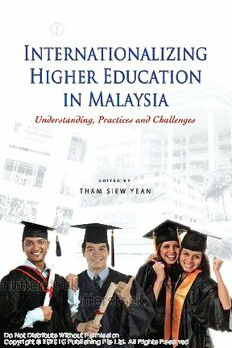
Internationalizing higher education in Malaysia : understanding, practices and challenges PDF
Preview Internationalizing higher education in Malaysia : understanding, practices and challenges
The Institute of Southeast Asian Studies (ISEAS) was established as an autonomous organization in 1968. It is a regional centre dedicated to the study of socio-political, security and economic trends and developments in Southeast Asia and its wider geostrategic and economic environment. The Institute’s research programmes are the Regional Economic Studies (RES, including ASEAN and APEC), Regional Strategic and Political Studies (RSPS), and Regional Social and Cultural Studies (RSCS). ISEAS Publishing, an established academic press, has issued more than 2,000 books and journals. It is the largest scholarly publisher of research about Southeast Asia from within the region. ISEAS Publishing works with many other academic and trade publishers and distributors to disseminate important research and analyses from and about Southeast Asia to the rest of the world. 00 Intl_zingHigherEdu.indd 2 11/22/12 9:22:08 AM First published in Singapore in 2013 by Institute of Southeast Asian Studies 30 Heng Mui Keng Terrace Pasir Panjang Singapore 119614 E-mail: [email protected] Website: http://bookshop.iseas.edu.sg All rights reserved. No part of this publication may be reproduced, stored in a retrieval system, or transmitted in any form or by any means, electronic, mechanical, photocopying, recording or otherwise, without the prior permission of the Institute of Southeast Asian Studies. © 2013 Institute of Southeast Asian Studies, Singapore. The responsibility for facts and opinions in this publication rests exclusively with the authors and their interpretations do not necessarily reflect the views of the policy of the publishers or their supporters. ISEAS Library Cataloguing-in-Publication Data Internationalizing higher education in Malaysia : understanding practices and challenges / edited by Tham, Siew Yean. 1. Education, Higher—Malaysia. 2. Education and globalization—Malaysia. I. Tham, Siew Yean. LA1238 I58 2013 ISBN 978-981-4380-96-6 (soft cover) ISBN 978-981-4380-97-3 (e-book, PDF) Typeset by Superskill Graphics Pte Ltd Printed in Singapore by Mainland Press Pte Ltd 00 Intl_zingHigherEdu.indd 4 11/22/12 9:22:09 AM ContEntS List of Tables vii List of Figures ix Preface xi Contributors xiii 1. From the Movement of Itinerant Scholars to a Strategic Process 1 Tham Siew Yean 2. Towards Understanding the Internationalization of Higher Education and its Challenges 18 Faridah Karim and Nooreiny Maarof 3. Public Universities: Development and Internationalization 41 Azizah Kassim 4. Private Higher Education Institutions: Development and Internationalization 66 Tham Siew Yean 5. Macro Perspectives: Ideas, Practices and Challenges 87 Ragayah H. Mat Zin and Liew Chei Siang 6. Micro Perspectives: Ideas, Practices and Challenges 113 Abdul Rahman Embong 7. Concluding Remarks 132 Tham Siew Yean Index 139 00 Intl_zingHigherEdu.indd 5 11/22/12 9:22:09 AM 00 Intl_zingHigherEdu.indd 6 11/22/12 9:22:09 AM LISt oF tABLES 2.1 Evolution of International Education Terminology 22 3.1 Public Universities in Malaysia, 2009 44 3.2 UM’s Global Partners, June 2009 50 3.3 UKM’s Global Partners (1992–2009) 54 3.4 Enrolment of International Students in Public Universities 2002–10 59 3.5 International Students Enrolment by Source Countries (2002 & 2010) 60 3.6 International Academic Staff in Public Universities by Types of Appointments, 2010 63 4.1 Number of Private University/Colleges as at 2011 67 4.2 Applicants and University Intake, 1970–86 69 4.3 Student Enrolment in Tertiary Education, 1985–2010 70 4.4 Types of Transnational Programmes Conducted by PrHEIs 77 4.5 Student Enrolment for a Bachelor Degree in PrHEIs according to Field of Studies, 2001–10 79 4.6 Enrolment of International Students in Public and Private HEIs, 2002–10 80 4.7 Academic Staff in PrHEIs, according to their Qualifications, 2001–10 82 5.1 Profile of Higher Education Institutions (HEIs) 90 5.2 Respondents’ Understanding of Internationalization by Type of Establishment 92 5.3 Importance of Internationalization by Type of Establishment 93 5.4 Understanding and Importance of Internationalization by Age of Establishment 94 5.5 Relevant Features of Internationalization 95 5.6 Relevant Features of Internationalization by Age of Establishment 96 5.7 Importance of Reasons for Internationalization by Type of Establishment 97 vii 00 Intl_zingHigherEdu.indd 7 11/22/12 9:22:09 AM viii List of Tables 5.8 Importance of Reasons for Internationalization by Age of Establishment 98 5.9 Benefits of Internationalization 99 5.10 Benefits of Internationalization by Year of Establishment 99 5.11 Negative Aspects of Internationalization by Type of Establishment 100 5.12 Negative Aspects of Internationalization by Age of Establishment 101 5.13 Action Plans, Policies & Strategies for Internationalization by Type of Establishment 102 5.14 Action Plans, Policies & Strategies for Internationalization by Age of Establishment 104 5.15 Top Three Target Markets for Recruiting Students and Faculty Members 105 5.16 Programmes Offered to International Students 105 5.17 Dimensions of Internationalization that are Expanding Rapidly by Type of Establishment 106 5.18 Dimensions of Internationalization that are Expanding Rapidly by Age of Establishment 107 5.19 Key Drivers of Internationalization by Type of Establishment 108 5.20 Key Drivers of internationalization by Age of Establishment 108 5.21 Challenges Faced in Internationalization by Type of Establishment 109 5.22 Challenges Faced in Internationalization by Age of Establishment 110 5.23 Familiarity with Trade Agreement in Services 111 5.24 Impact of Trade Agreements on Internationalization of Education Services 111 00 Intl_zingHigherEdu.indd 8 11/22/12 9:22:09 AM LISt oF FIGURES 2.1 Conceptual Framework of Knight and van der Wende (in de Wit, 2002) 25 2.2 Conceptual Framework for Higher Education Institutions (adapted from Knight and van der Wende in de Wit, 2002) 26 3.1 Enrolment of Foreign Students by Type of Degree, 2010 (N=24,214) 61 3.2 Enrolment of Foreign Students by Discipline, 2010 (N=24,214) 62 ix 00 Intl_zingHigherEdu.indd 9 11/22/12 9:22:09 AM
